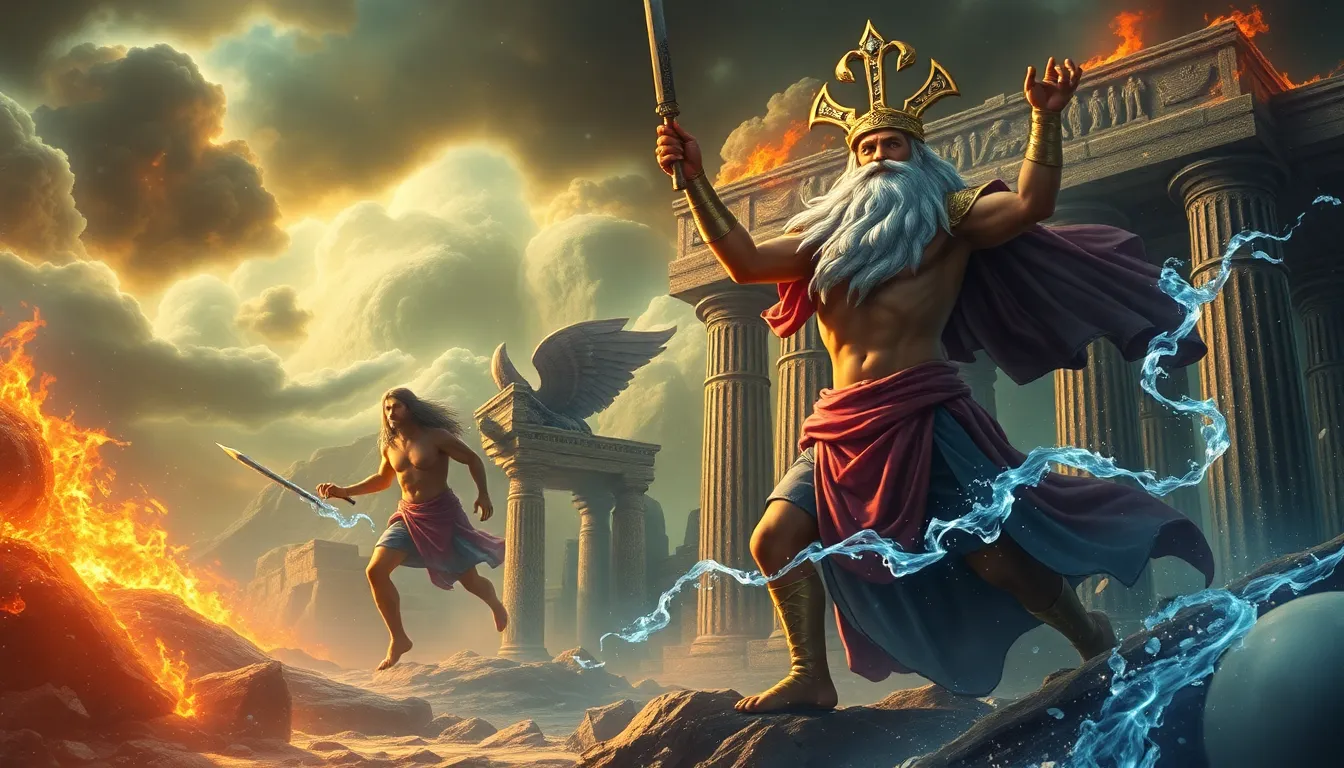Mythical Encounters: Heroes Who Faced the Wrath of the Gods
I. Introduction
Mythical heroes have played a significant role in various cultures throughout history, serving as embodiments of virtues, ideals, and the human experience. In Greek mythology, heroes often find themselves in conflict with the divine, navigating a complex relationship characterized by both reverence and resentment.
The relationship between heroes and gods is intricate; while heroes may be favored or aided by the gods, they also face the consequences of divine wrath, driven by jealousy, pride, or a desire to maintain cosmic order. This article aims to explore notable encounters between heroes and divine beings, highlighting the trials and tribulations that shaped their legendary narratives.
II. The Nature of Divine Wrath
Divine wrath in mythology can be understood as the anger or vengeance exhibited by gods towards mortals. This wrath often stems from:
- Hubris: Excessive pride or defiance towards the gods.
- Injustice: Mortals committing acts that upset the divine order.
- Insult: Offending the gods through disrespectful actions or words.
The repercussions of divine wrath can be severe, leading to dire consequences for heroes. Such actions may serve as catalysts for the hero’s journey, instilling lessons about humility, respect, and the acknowledgment of greater powers.
III. Hercules: The Twelve Labors and the Fury of Hera
Hercules, one of the most celebrated heroes in Greek mythology, is renowned for his immense strength and heroic feats. Born to Zeus and the mortal Alcmena, his life was marked by the envy of Hera, Zeus’s wife.
Hera’s jealousy led her to inflict madness upon Hercules, causing him to kill his wife and children. To atone for these acts, he was tasked with performing the Twelve Labors, a series of seemingly impossible tasks that included:
- Slaying the Nemean Lion
- Capturing the Golden Hind of Artemis
- Defeating the nine-headed Hydra
- Capturing the Ceryneian Hind
These labors not only tested Hercules’s strength and ingenuity but also highlighted the theme of redemption. Each labor shaped his character, transforming him from a man burdened by guilt into a symbol of resilience and heroism.
IV. Odysseus: The Curse of Poseidon
Odysseus, the cunning hero of Homer’s “The Iliad” and “The Odyssey,” faced significant divine challenges during his journey home from the Trojan War. His cleverness is well-known, but he also incurred the wrath of Poseidon, the god of the sea.
Poseidon’s anger was ignited when Odysseus blinded Polyphemus, his Cyclopean son. As a result, Odysseus encountered numerous obstacles, including:
- Storms that tossed his ship across the seas
- Encounters with the Sirens and their deadly songs
- The wrathful Scylla and Charybdis
These challenges tested Odysseus’s resilience and resourcefulness. His journey reflects the theme of human tenacity in the face of divine punishment, emphasizing that while the gods can be vengeful, mortals possess the strength to endure and overcome their trials.
V. Theseus: The Wrath of the Gods in the Underworld
Theseus, a hero known for his strength and wit, encountered the wrath of the gods during his adventures, particularly when he journeyed to the Underworld. His exploits included slaying the Minotaur and navigating the labyrinth, showcasing his bravery.
However, his descent into the Underworld to rescue Persephone came with dire consequences. There, Theseus faced Hades and the peril of being trapped in eternal darkness. His defiance of the gods reflects themes of bravery and hubris. Despite his noble intentions, he learned that:
- The Underworld is a realm where even heroes face limitations.
- Hubris can lead to punishment, as he was nearly trapped forever.
Theseus’s narrative serves as a cautionary tale about the consequences of overstepping boundaries set by the divine.
VI. Gilgamesh: The Quest for Immortality and Divine Disfavor
The Epic of Gilgamesh, one of the oldest known literary works, tells the story of Gilgamesh, the king of Uruk, who embarks on a quest for immortality. His journey is marked by encounters with divine beings and the wrath they unleash upon him.
In his quest, Gilgamesh faced several challenges, including the killing of the Cedar Forest guardian, Humbaba, and the slaying of the Bull of Heaven sent by the goddess Ishtar. The gods’ wrath manifested in the form of:
- The death of his friend Enkidu, a consequence of their defiance.
- Natural disasters and trials during his journey.
Gilgamesh’s encounters reflect profound themes of mortality and the limits of human power, ultimately leading him to accept his fate as a mortal and to cherish the legacy he leaves behind.
VII. Perseus: The Challenge of the Gorgons and Divine Intervention
Perseus, a hero known for his bravery and wit, was tasked with a perilous mission: to slay Medusa, one of the Gorgons whose gaze could turn men to stone. Unlike many heroes who faced the wrath of the gods, Perseus received divine support from Athena and Hermes, highlighting the balance between heroism and divine intervention.
With the aid of the gods, Perseus was equipped with:
- A reflective shield from Athena to avoid Medusa’s deadly gaze.
- Winged sandals from Hermes for swift travel.
- A magical sword to slay the Gorgon.
Perseus’s story illustrates how divine support can aid heroes in their quests while also emphasizing the importance of human ingenuity and courage in overcoming formidable challenges.
VIII. Conclusion
The encounters between mythical heroes and the wrath of the gods reveal timeless themes of pride, resilience, and the complex relationship between humanity and the divine. From Hercules’s labors to Odysseus’s trials, and from Theseus’s defiance to Gilgamesh’s quest for immortality, these stories resonate across cultures and generations.
These narratives have had a lasting impact on literature and culture, shaping our understanding of heroism and the consequences of our actions. They remind us of the delicate balance between human ambition and divine authority, a reflection that continues to inspire and challenge us in our own lives.




